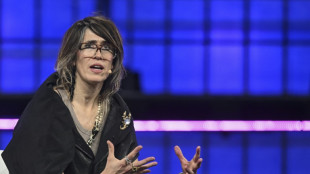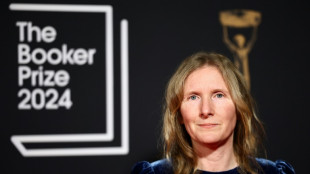
-
 Chris Wood hits quickfire double in NZ World Cup qualifying romp
Chris Wood hits quickfire double in NZ World Cup qualifying romp
-
Markets struggle at end of tough week

-
 China tests building Moon base with lunar soil bricks
China tests building Moon base with lunar soil bricks
-
Film's 'search for Palestine' takes centre stage at Cairo festival

-
 Oil execs work COP29 as NGOs slam lobbyist presence
Oil execs work COP29 as NGOs slam lobbyist presence
-
Gore says climate progress 'won't slow much' because of Trump

-
 'Megaquake' warning hits Japan's growth
'Megaquake' warning hits Japan's growth
-
Stiff business: Berlin startup will freeze your corpse for monthly fee

-
 Wars, looming Trump reign set to dominate G20 summit
Wars, looming Trump reign set to dominate G20 summit
-
Xi, Biden attend Asia-Pacific summit, prepare to meet

-
 Kyrgios to make competitive return at Brisbane next month after injuries
Kyrgios to make competitive return at Brisbane next month after injuries
-
Dominican Juan Luis Guerra triumphs at 25th annual Latin Grammys

-
 Landslide win for Sri Lanka president's leftist coalition in snap polls
Landslide win for Sri Lanka president's leftist coalition in snap polls
-
Australian World Cup penalty hero Vine takes mental health break

-
 As Philippines picks up from Usagi, a fresh storm bears down
As Philippines picks up from Usagi, a fresh storm bears down
-
Tropical Storm Sara pounds Honduras with heavy rain

-
 Pepi gives Pochettino win for USA in Jamaica
Pepi gives Pochettino win for USA in Jamaica
-
'Hell to heaven' as China reignite World Cup hopes with late winner

-
 Rebel attacks keep Indian-run Kashmir on the boil
Rebel attacks keep Indian-run Kashmir on the boil
-
New Zealand challenge 'immense but fantastic' for France

-
 Under pressure England boss Borthwick in Springboks' spotlight
Under pressure England boss Borthwick in Springboks' spotlight
-
All Blacks plan to nullify 'freakish' Dupont, says Lienert-Brown

-
 TikTok makes AI driven ad tool available globally
TikTok makes AI driven ad tool available globally
-
Japan growth slows as new PM readies stimulus

-
 China retail sales pick up speed, beat forecasts in October
China retail sales pick up speed, beat forecasts in October
-
Asian markets fluctuate at end of tough week

-
 Gay, trans people voicing -- and sometimes screaming -- Trump concerns
Gay, trans people voicing -- and sometimes screaming -- Trump concerns
-
Argentina fall in Paraguay, Brazil held in Venezuela

-
 N. Korean leader orders 'mass production' of attack drones
N. Korean leader orders 'mass production' of attack drones
-
Pakistan's policies hazy as it fights smog

-
 Nature pays price for war in Israel's north
Nature pays price for war in Israel's north
-
New Zealand's prolific Williamson back for England Test series

-
 Mexico City youth grapple with growing housing crisis
Mexico City youth grapple with growing housing crisis
-
After Trump's victory, US election falsehoods shift left

-
 Cracks deepen in Canada's pro-immigration 'consensus'
Cracks deepen in Canada's pro-immigration 'consensus'
-
Xi inaugurates South America's first Chinese-funded port in Peru

-
 Tyson slaps Paul in final face-off before Netflix bout
Tyson slaps Paul in final face-off before Netflix bout
-
England wrap-up T20 series win over West Indies

-
 Stewards intervene to stop Israel, France football fans clash at Paris match
Stewards intervene to stop Israel, France football fans clash at Paris match
-
Special counsel hits pause on Trump documents case

-
 Japan's Princess Mikasa, great aunt to emperor, dies aged 101
Japan's Princess Mikasa, great aunt to emperor, dies aged 101
-
Cricket at 2028 Olympics could be held outside Los Angeles

-
 Trump names vaccine skeptic RFK Jr. to head health dept
Trump names vaccine skeptic RFK Jr. to head health dept
-
Ye claims 'Jews' controlling Kardashian clan: lawsuit

-
 Japan into BJK Cup quarter-finals as Slovakia stun USA
Japan into BJK Cup quarter-finals as Slovakia stun USA
-
Sri Lanka president's party headed for landslide: early results

-
 Olympics 'above politics' say LA 2028 organisers after Trump win
Olympics 'above politics' say LA 2028 organisers after Trump win
-
Panic strikes Port-au-Prince as residents flee gang violence

-
 Carsley hails England's strength in depth as understudies sink Greece
Carsley hails England's strength in depth as understudies sink Greece
-
Undefeated Chiefs lose kicker Butker to knee injury

| RBGPF | 100% | 61.84 | $ | |
| GSK | -2.09% | 34.39 | $ | |
| BP | 1.65% | 29.05 | $ | |
| SCS | -0.75% | 13.27 | $ | |
| BCC | -1.57% | 140.35 | $ | |
| RELX | -0.37% | 45.95 | $ | |
| RIO | -0.31% | 60.43 | $ | |
| CMSD | -0.02% | 24.725 | $ | |
| CMSC | -0.24% | 24.55 | $ | |
| NGG | 0.4% | 62.37 | $ | |
| RYCEF | -4.71% | 6.79 | $ | |
| JRI | -0.23% | 13.21 | $ | |
| BTI | 0.2% | 35.49 | $ | |
| AZN | -0.38% | 65.04 | $ | |
| VOD | -0.81% | 8.68 | $ | |
| BCE | -1.38% | 26.84 | $ |

Hello Hallyu: why is South Korean culture sweeping the globe?
It's won Oscars. Its television shows and K-pop stars dominate global charts. Its leading novelist just won the Nobel literature prize. How did South Korea become such a global cultural powerhouse?
AFP takes a look at what we know:
What is Hallyu?
From the late 1990s, Korean dramas and K-pop idols started gaining traction in neighbouring Asian countries like China and Japan, marking the start of Hallyu, or the Korean Wave.
It wasn't until Psy's breakout hit "Gangnam Style" that Hallyu hit the West.
In the decade that followed, "Babyshark" broke YouTube records, K-pop megastars BTS topped the charts, Bong Joon-ho's "Parasite" won an Oscar, and Squid Game became Netflix's most-watched non-English television show.
Cultural exports were worth some $13.2 billion to South Korea in 2022, more than home appliances or electric cars -- but the bulk of that was made up of video games, such as Battlegrounds Mobile which are wildly popular in India and Pakistan.
The government is targeting $25 billion by 2027 -- so expect more K-culture, especially in new markets such as Europe and the Middle East.
Why South Korea?
For Oscar-winning "Parasite" director Bong Joon-ho, the key to the East Asian country's cultural success is that everyone has lived through "dramatic times".
The 1950s Korean War -- which left Seoul locked in conflict with its nuclear-armed northern neighbour -- military dictatorship, sweeping economic transformation, and a democratic transition.
In the South, many have "experienced turbulence and extreme events," Bong has said. As a result "our movies can't help but different."
South Korea "provides creators with ample inspiration and stimulation. It's such a dynamic and turbulent place," he said.
Renowned South Korean filmmaker Park Chan-wook had a similar answer when asked for the secret of his country's cinematic success. "Why don't you try living in 'dynamic Korea?'" he replied.
And K-literature?
Turning contemporary history into art is what 53-year-old novelist Han Kang, who won the literature Nobel Thursday, excels at.
Han has spoken of the transformative experience of learning about a 1980 massacre in her native Gwangju, when South Korea's then-military government violently repressed a democratic uprising.
Han said her father showed her photographs including the scattered bodies of victims, and citizens lining up to donate blood in the chaos -- which later inspired her book "Human Acts".
While many South Korean authors have delved into the themes of the country's traumatic past, Han established her own "striking literary aesthetic" while addressing challenging subjects, said Oh Hyung-yup, a Korean literature professor at Korea University and literary critic.
Women first?
South Korea has some of the worst rates of female workforce participation among advanced economies, but for cultural exports women have been trailblazers.
Han's Booker-winning novel "The Vegetarian", which follows a woman who stops eating meat, is regarded as a landmark ecofeminism text. But it was outsold internationally by Cho Nam-Joo's "Kim Ji-young, Born 1982" about a married South Korean woman who quits her job to raise her child.
As the first Asian woman to win a Nobel for literature, it is appropriate that Han Kang's work addresses violence in ways that male authors have not in the past, Kang Ji-hee, a South Korean literary critic, told AFP.
"Han Kang reinterpreted this type of internal struggle," Kang said, documenting behaviours "that were previously considered to be simply passive, and gave them a whole new meaning."
So was it the government?
With the growing success of K-culture exports across the board -- from film to food, with Korean staples like kimchi and bibimbap soaring in popularity overseas -- it seems like part of a masterplan.
But while the South Korean government has ploughed millions into supporting cultural industries, experts say success has come largely despite, not because, of the state.
When former-president Park Geun-hye was in power from 2013 to 2017, Nobel-winner Han was one of over 9,000 artists "blacklisted" for criticising her government, along with Bong.
Some government initiatives, for example the government-affiliated Literature Translation Institute of Korea (LTI Korea), may have paid off, helping to bring works like Han's to a global audience.
But a growing number of translators, who are more adventurous with their choice of works, have also helped to bring edgier offers to the international market.
Success also breeds more success, cultural export-wise: The reading habits of K-pop megastars have boosted K-literature.
When BTS member Jungkook was seen reading the self-help book "I Decided to Live as Me" it sparked a sales frenzy, with hundreds of thousands of copies flying off shelves.
But Bong also believes that his compatriots' hard drinking habits helped spur creativity.
"We are a very workaholic country. People work too much. And, at the same time, we drink too much. So every night, very hardcore drinking sessions and everything is very extreme."
W.Stewart--AT


